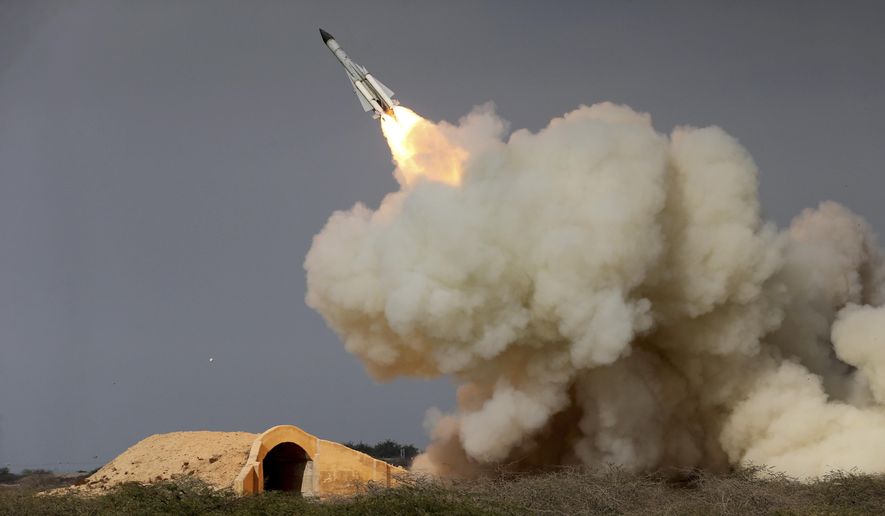The Trump administration has imposed a slate of new economic sanctions against 13 Iranian individuals and 12 companies in response to the Islamic republic’s recent ballistic missile test that the White House says violated a U.N. Security Council Resolution.
The sanctions target people thought to be involved in the procurement and development of ballistic missile technology in Iran, as well as individuals and entities that U.S. officials say are affiliated with the Hezbollah and the Iranian Revolutionary Guards Corps.
“Iran’s continued support for terrorism and development of its ballistic missile program poses a threat to the region, to our partners worldwide, and to the United States,” John E. Smith, the acting director of the Treasury Department’s Office of Foreign Assets Control, said in a statement.
“We will continue to actively apply all available tools, including financial sanctions, to address this behavior,” he said.
Most of the individuals and entities designated are based in Tehran, although several in the United Arab Emirates, Lebanon and China were also targeted by the sanctions, which block those designated from doing business with anyone who has assets in U.S. markets.
The development marks the most dramatic escalation in tension between Washington and Tehran since the signing of the Obama administration-backed Iranian nuclear accord in 2015.
Trump administration officials said Friday that the new sanctions were imposed under an authority previously issued by President Obama and do not conflict with the nuclear accord, which had included strict guidelines by which Washington and other nations could level new penalties against Iran.
The accord reached between Iran, the U.S., Germany, France, Britain, China and Russia had broadly lifted sanctions on Iran in exchange for limits on Tehran’s nuclear program and regular international inspections.
White House National Security Adviser Michael Flynn said Iran’s “belligerent and lawless behavior” has increased since the nuclear deal was signed. He cited the abduction of 10 U.S. sailors and two patrol boats in January 2016 as “unwarranted harassment of vessel traffic and repeated weapons tests.”
“The international community has been too tolerant of Iran’s bad behavior,” Mr. Flynn said. “The ritual of convening a United Nations Security Council in an emergency meeting and issuing a strong statement is not enough. The days of turning a blind eye to Iran’s hostile and belligerent actions toward the United States and the world community are over.”
Friday’s announcement followed days of aggressive rhetoric from the Trump administration toward Iran, which U.S. officials say conducted a ballistic missile test Sunday in violation of U.N. Security Council Resolution 2231.
The resolution, which was adopted in 2015 to make the nuclear accord with Iran official, included an annex calling on Iran not to undertake any activity related to ballistic missiles designed to be capable of delivering nuclear weapons, including launches using such ballistic missile technology.
One senior administration official told reporters Friday that the Iranian government and military is engaged in “behavior that is not sustainable, not acceptable and violates norms and creates instability in [the Middle East].”
“Iran has to determine its response to our actions,” the official said. “Iran has a choice to make. We are going to continue to respond to their behavior in an ongoing way at an appropriate level to continue to pressure them to change their behavior.”
House Speaker Paul D. Ryan said Friday that the White House’s “swift and decisive” action “proves that our new administration is serious about holding the Iranian regime accountable for its illicit behavior.”
Hours before Friday’s development, Iranian Foreign Minister Mohammad Javad Zarif tweeted that Iran is “unmoved by threats” from Washington, adding that Iran’s actions are purely defensive.
“We’ll never initiate war, but we can only rely on our own means of defense,” Mr. Zarif wrote.
His comments came a day after other Iranian officials vowed to advance their nation’s ballistic missile program, while a top state-run media outlet in the Islamic republic declared that Tehran is putting “the U.S. on notice” — not the other way around.
• Dave Boyer can be reached at dboyer@washingtontimes.com.
• Guy Taylor can be reached at gtaylor@washingtontimes.com.




Please read our comment policy before commenting.